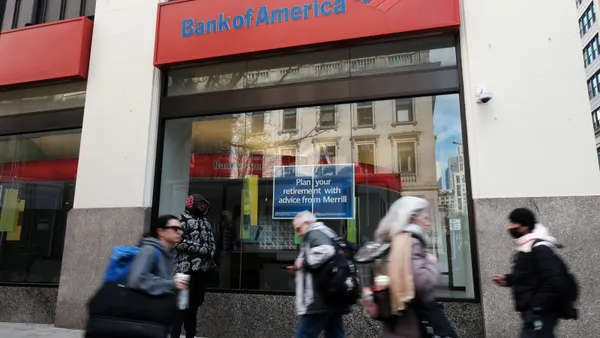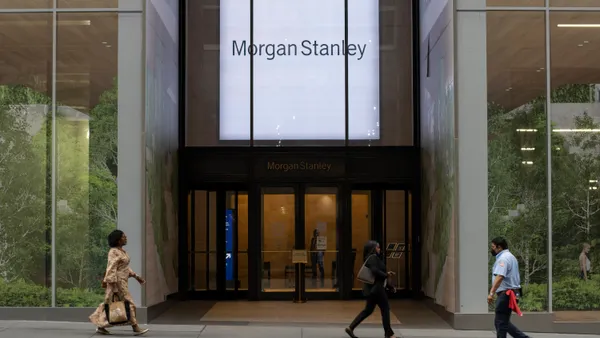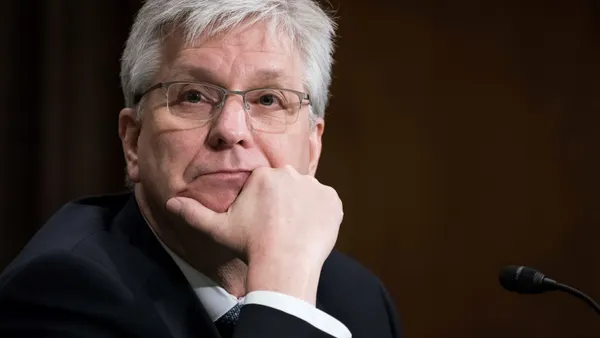Dive Brief:
- Central banks would be the most trusted issuers of digital currency, according to more than 13,000 people in 13 countries surveyed this fall on behalf of the Official Monetary and Financial Institutions Forum (OMFIF) in a report published last week. About 51% of respondents said they’d trust a digital currency issued by a central bank.
-
At 37%, internet technology companies ranked as the least trusted among five options. Payment service providers such as PayPal rated second-highest at 48%, followed by commercial banks and credit card companies.
-
The report comes during a week when Federal Reserve Gov. Lael Brainard said the U.S.’s central bank was exploring policy, design and legal considerations around potentially issuing its own digital coin.
Dive Insight:
Facebook’s development of the Libra cryptocurrency project served as a specter in both the OMFIF report and Brainard’s comments. The social network announced in June it was aiming to roll out the coin this year, but company representatives have since backed off on providing a firm launch date because of regulatory concerns in the U.S. and European Union. Eight of the 28 companies that originally backed Libra have abandoned the project, including Mastercard, Visa, Stripe and eBay.
Libra "has imparted urgency to the debate over what form money can take, who or what can issue it, and how payments can be recorded and settled," Brainard said Wednesday at the Stanford Graduate School of Business in California, according to Bloomberg.
"By transforming payments, digitalization has the potential to deliver greater value and convenience at lower cost," Brainard said. "But there are risks," she added, citing the need for vigilance against money laundering and terrorism financing.
Brainard said the Fed was collaborating with other central banks to "advance its understanding of central bank digital currencies," adding that other countries’ efforts, particularly China’s to develop a digital yuan, serve as an impetus to "[make] sure that we are that frontier of both research and policy development."
The Fed governor’s comments mark a bit of a turnaround from those she made two years ago, according to Reuters, which quoted Brainard as saying then that there was “no compelling demonstrated need” for a central bank digital coin.
In the interim, the Fed has also committed to developing a real-time payment system, FedNow, to be operational by 2024.
Private think tanks such as one launched by former Commodity Futures Trading Commission Chairman J. Christopher Giancarlo are also studying how to digitize the dollar.
In her speech Wednesday, Brainard called for the public sector to "engage actively with the private sector and the research community to consider whether new guardrails need to be established, whether existing regulatory perimeters need to be redrawn, and whether a [central bank digital currency] would deliver important benefits on net."
OMFIF reported several trends in its survey: namely, that digital currencies serve as a source of trust for younger, richer and more educated users over older, less wealthy and less educated ones, and for more men than women.
About 57% of respondents in emerging markets said they would have a relative degree of confidence in a digital currency, no matter which provider was behind it. Of the 13 countries' populations surveyed, Indians were the most supportive of tech companies, with 66% backing that.
Among the measures of confidence included in the survey was net trust — the number of percentage points difference between trustworthiness and untrustworthiness. Overall, central banks scored the highest net trust rating, at more than 13 percentage points.
Tech companies scored a net trust rating of about minus-10 percentage points, according to the survey. That, too, varied among emerging and developed markets. In France and Germany, for example, tech companies had net trust score exceeding minus-30 percentage points.












